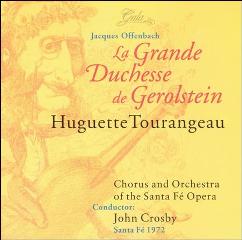Jacques Offenbach - La Grande Duchesse de Gerólstein (1972)
Jacques Offenbach - La Grande Duchesse de Gerólstein (1972)

Disc 1 1 Act 1. Overture 2 Act 1. Narrator 3 Act 1. En attendant que l'heure sonne... 4 Act 1. Narrator 5 Act 1. O mon Fritz, que tu m'affliges 6 Act 1. Narrator 7 Act 1. Des femmes dans le camp 8 Act 1. Narrator 9 Act 1. Me voici, Fritz! J'ai tant couru 10 Act 1. Narrator 11 Act 1. Portons armes! Presentons armes! 12 Act 1. Narrator 13 Act 1. Chanson du regiment: Ah, c'est un fameux regiment 14 Act 1. Narrator 15 Act 1. Pour Epouser une princesse 16 Finale: Nous allions partir pour la guerre 17 Finale: Mais je suis reine 18 Finale: Je serai vainqueur 19 Act 2. Scene 1. Introduction 20 Act 2. Scene 1. Narrator 21 Act 2. Scene 1. Enfin la guerre est terminee 22 Act 2. Scene 1. Narrator 23 Act 2. Scene 1. Apres la victoire 24 Act 2. Scene 1. Madame, en quatre jours 25 Act 2. Scene 1. En tres bon ordre nous partemes Disc 2 1 Act 2. Scene 1. Narrator 2 Act 2. Scene 1. Voici ce qu'a dit mon amie 3 Act 2. Scene 1. Eh bien, reponds-moi maintenant 4 Act 2. Scene 1. Narrator 5 Act 2. Scene 1. Ne devinez-vous pas? 6 Act 2. Scene 1. Maintenant, me comprenez-vous? 7 Act 3. Prelude 8 Act 3. Narrator 9 Act 3. O grandes lesons du passe! 10 Act 3. Narrator 11 Act 3. Nous amenons la jeune femme 12 Act 3. Bonne nuit! 13 Act 3. Faut-il, mon Dieu, que je sois bete! 14 3. Au repas comme a la bataille 15 Act 3. Narrator 16 Act 3. Voici revenir mon pauvre homme! 17 Act 3. Eh bien, Altesse, me voila ! 18 Act 3. Narrator 19 Finale: Enfin, j'ai repris le pouvoir! La Grande Duchesse - Huguette Tourangeau Fritz - John Walker Prince Paul - Richard Stilwell Baron Puck - Douglas Perry Général Boum - Donald Gramm Baron Grog - Jack Davidson Népomuc - John Hall Wanda - Susan Belling Santa Fe Opera Orchestra and Chorus John Crosby – conductor
As Napoléon III's expansionist ambitions laced French political life with a frisson of precariousness, the waning years of the Second Empire were iconographically marked by Offenbach's frothiest, most ambitious, and most enduring operettas, satires all -- La Belle Hélène (1864), guying the stupidity and cupidity of "heroes" and rulers; La Vie parisienne (1866), establishing the myth of Paris as the jaded capital of worldly pleasures; and, with the latter still enjoying a smash-hit run, La Grande-Duchesse de Gérolstein, opening at the Paris Variétés on April 12, 1867, after being cobbled together at breakneck speed to accompany the inauguration of the Paris World Exposition. Henri Meilhac and Ludovic Halévy, librettists of those triumphs (and, in 1873, of Bizet's Carmen), were tapped once again, though Offenbach, guided by his keen sense of timing, exercised a major hand in shaping the book. With the Exposition drawing the full panoply of European royalty, nothing was spared to assure La Grande Duchesse's surefire success, beginning with the soprano lead, the grand duchess herself, for which Offenbach signed the reigning diva of operetta -- the creator of Helen in La Belle Hélène, among several other Offenbach roles -- the legendary Hortense Schneider at the astronomical sum of 4,500 francs a month. Tall, blonde, buxom, vocally endowed, with a saucily commanding presence on-stage and off, Schneider was charismatically fitted to portray one of the libretto's not-so-covert targets, Tsarina Catherine II, "the Great," whose sexual precocity -- in Don Juan, Byron refers to her as "queen of queans" and "greatest of all sovereigns and whores" -- was a still living memory and never-ending scandal. The pretentious pomp of militarism, petty intrigues, and overbearing idiocy masquerading in uniform provided other ready targets. Bismarck, who came for the Exhibition with the King of Prussia, attended, leaving with the remark "C'est tout-a-fait ça!" (That's how it is!) Emperor Napoléon waited until April 24 to see it, but soon returned with Empress Eugénie. The Prince of Wales, Tsar Alexander II (who wired ahead from Cologne for a ticket), the Kings of Bavaria, Portugal, and Sweden, the Sultan of Turkey, the Viceroy of Egypt, Ismail Pasha -- all came at least once, and some many times. Following the opening, a few small cuts facilitated the work's spanking pace, coruscating brilliance, and unflagging effervescence escalating, at frequent intervals, into irresistible tunefulness. In the upshot, La Grande-Duchesse de Gérolstein became an immediate international hit, playing to rapt audiences in Vienna, London, and New York before the year was out. ---Adrian Corleonis, Rovi
download: uploaded yandex 4shared mediafire solidfiles mega filecloudio nornar
Last Updated (Wednesday, 05 March 2014 12:19)








